Oscars: best foreign film contenders
- Published
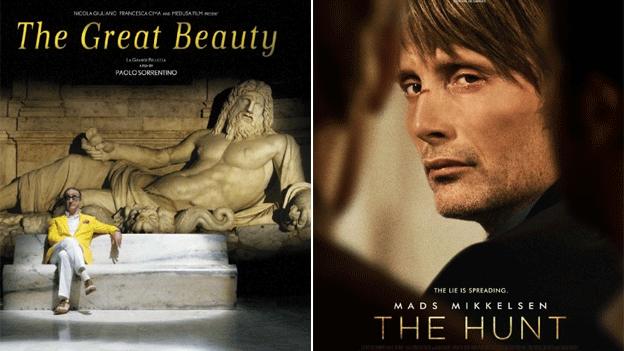
Amid the glitz and glamour of Oscar night, the Academy Award for Best Foreign Language Film seldom gets much media attention but it provides a valuable snapshot each year of what is happening in cinema beyond Hollywood. This year, the way the Oscar is awarded has altered. Could change bring a different kind of winner?
An Oscar for Best Foreign Language Film has existed since 1947 - though for the first decade the winner was simply selected by the Academy of Motion Picture Arts and Sciences without competition.
The category has had a complex, and at times controversial, voting procedure which few have been entirely happy with or have entirely understood.
This time the chairman of the AMPAS Foreign Language Film committee, Mark Johnson, has again overhauled the system in an attempt to involve more Oscar voters.
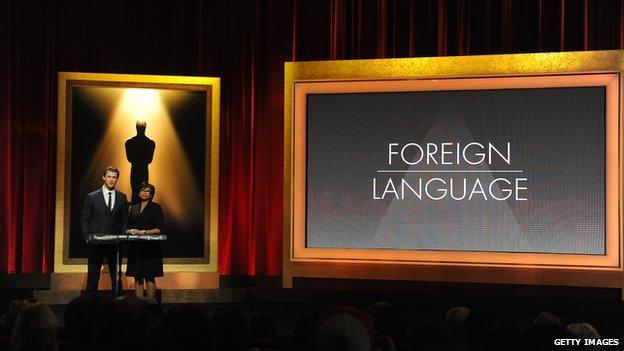
Chris Hemsworth and Cheryl Boone Isaacs, the president of AMPAS, announced this year's nominations
The selection process is unlike other Oscar categories:
The Academy invites a single nomination from national film bodies around the world. Each year there's criticism that big industries such as France and India get only one shot at the Academy Award, the same as a small country. But there is already a large number of entries (76 this year) for AMPAS to deal with. There are frequent squabbles at national level about which film is put forward but to its relief that is not really the Academy's concern.
The submissions are viewed by a volunteer committee of Oscar voters over a period of weeks. The committee is divided so members need watch only a portion of the films. Critics of the system point out that the time required means volunteers tend to be older, retired Academy members. The six films attracting the most support go to the next stage.
The Academy can now add three films which it feels should have made the cut but which did not.
These nine films are watched by a special committee -20 people in Los Angeles and 10 in New York. Over an intensive weekend of wall-to-wall subtitling they drop four films, reducing the shortlist to five.
Previously the final vote was the work of a few hundred members at most. But starting this year the requirement to see all five films in a cinema has been abolished: watching a screener (promotional DVD) is enough. That all 6000 Academy members can now vote for the winner could potentially change the dynamic in a big way.
Unlike last year, with Michael Haneke's Amour, there is no obvious front-runner. So which of the five will triumph?
THE BROKEN CIRCLE BREAKDOWN

Johan Heldenbergh plays Didier, alongside Veerle Beatens as Elise
Country: Belgium
Language: Flemish, with English-language songs
Belgium's Track Record: Belgium's seventh Oscar nomination in this category - though it has never won
Director: Felix van Groeningen
Story: Didier meets Elise. He is older and a fan of things American. He plays banjo with a Bluegrass band and Elise becomes their vocalist. Soon the couple have a daughter, Maybelle. But Maybelle becomes seriously ill and huge pressure is brought to bear on the couple's relationship.
The story is about grief and how we cope with it but there is a lot of attractive music along the way too.
Chances of winning: Based on a play co-written by lead actor Johan Heldenbergh, the film was well received at last year's Berlin Film Festival and had good reviews internationally. Central performances are strong.
It's not hard to predict the first disaster the family will face but then the director lets the audience in on a second calamity long before he needs to - after which the storyline is too obvious and sags.
But some Oscar voters will engage with the family tragedy and many will enjoy the Bluegrass - which usefully gives the film some English-language content.
THE GREAT BEAUTY
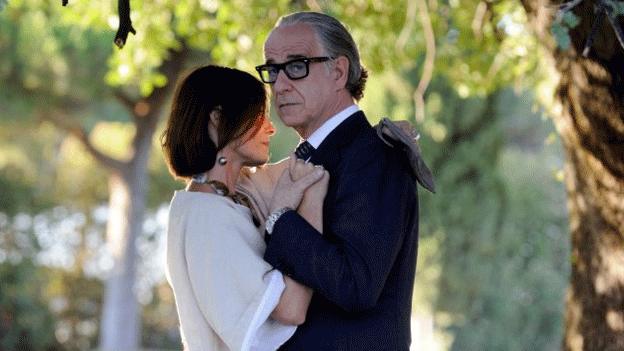
Galatea Ranzi plays Stefania alongside Toni Servillo as Jep Gambardella
Country: Italy
Language: Italian
Italy's Track Record: Italy has been nominated a massive 28 times. However the most recent of ten victories was in 1998. (In addition there were three wins before 1956, when the winner was at the Academy's discretion.)
Director: Paolo Sorrentino
Story: Jep Gambardella (played by Toni Servillo) is a successful journalist in Rome.
As a young man he wrote a much-praised novel but he's now become a social butterfly enjoying everything high society in Rome has to offer. Reaching 65, Jep takes stock of his life and relationships.
Chances of winning: The film won the Bafta equivalent of Best Foreign Language Film - the Best Film Not in the English Language on Sunday.
Sorrentino's film was popular with critics at last year's Cannes: some clearly enjoyed revisiting the glamorous Rome which Federico Fellini made his own in the 1950s and 1960s. The film shows a city filled with attractive people, sexual adventure and gorgeous architecture.
In its latter half the story becomes more political but probably few Academy voters will care much about swipes at Silvio Berlusconi and Italy's political class generally. The film's energy and style may be enough to give Sorrentino victory.
THE HUNT
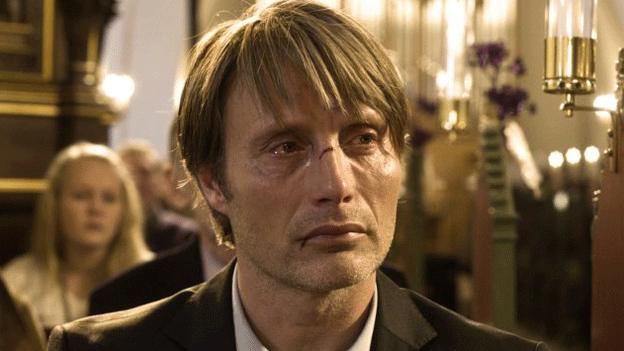
Mads Mikkelsen won the Cannes Film Festival Best Actor Award in 2012 for his role as Lucas in The Hunt
Country: Denmark
Language: Danish
Denmark's Track Record: Denmark has been nominated 10 times. It won in 1987, 1988 and 2010.
Director: Thomas Vinterberg
Story: Lucas (Mads Mikkelsen) is a teaching assistant at a nursery in a small Danish town and is popular with the young children. One of them, Klara, becomes emotionally attached to him perhaps because her home-life offers very little warmth or security.
Feeling rejected by him, Klara seems to suggest Lucas has sexually assaulted her. Soon the tightly-knit community turns against the previously loved and respected teacher.
Chances of winning: A standard TV police procedural would play a guessing-game with the audience - is Lucas guilty of what he's accused of?
But Thomas Vinterberg is putting society on trial, not an individual. The characters are convincingly flawed, such as the head teacher who too quickly takes the child's side on principle. Mikkelsen, as usual, gives a terrific performance as a man wrongly accused.
The story will find echoes beyond Scandinavia and it's just possible the Academy will prefer it to the glamour of the Italian entry. The screenplay conveniently gives Lucas an eastern European girlfriend with whom he communicates in English - a canny boost to international sales and Oscar chances?
THE MISSING PICTURE
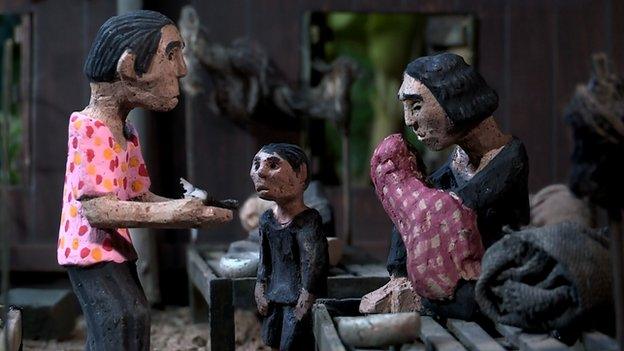
Wooden dolls are used to dramatise events in The Missing Picture
Country: Cambodia
Language: French
Cambodia's track record: This is the country's first Oscar nomination
Director: Rithy Panh
Story: Unusually for this category The Missing Picture is a documentary, though not a standard one. It recounts what happened in the director's native Cambodia after Pol Pot came to power in the 1960s.
Around half the film is old documentary and news footage of the sort you might find in a TV programme about Cambodian history. But Rithy Panh also uses wooden dolls to dramatise what happened to his family and to society generally.
Chances of winning: One of the least traditional entries ever in this category. It may appeal to voters who think the Oscars too often ignore the unusual and quirky.
The doll device works unexpectedly well. This year's new voting procedures may help the film attract Academy voters more used to documentaries than to feature films.
In terms of production, the film is almost as much French as it is Cambodian: its natural home may ultimately be on TV.
OMAR
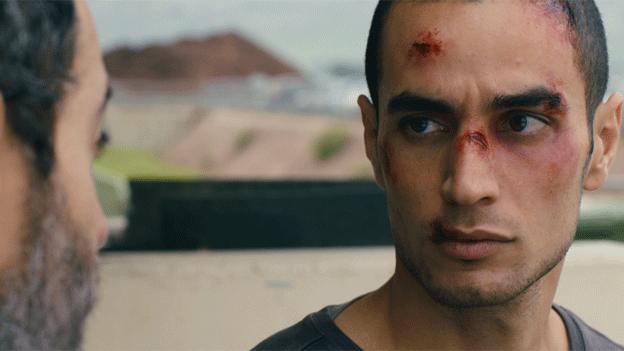
Adam Bakri plays the title role of Omar - the LA Times called the film "an incredible love story"
Country: Palestine
Language: Arabic
Palestinian Track Record: It's their second nomination: the first was from the same director.
Director: Hany Abu-Assad
Story: Omar is a young Palestinian who works as a baker and who wants to get together with the attractive Nadia. Her brother persuades him to take part in an armed mission in the West Bank in which an Israeli soldier is shot dead.
Omar is picked up by the Israelis who decide he could be a means of tracking down bigger figures. Omar's life spins out of control: is there anybody he can now trust?
Chances of winning: Like Abu-Assad's Oscar-nominated Paradise Now (2005) this is a well-made thriller with a distinct political slant.
After the earlier film Abu-Assad had an unhappy time in Hollywood making The Courier but he is a skilled director who knows how to build tension.
The relentlessly negative portrayal of Israel may not find favour in Hollywood. There is an unconvincing point in the plot where the Israelis make the same basic error twice and credibility wobbles. But locations and lead performances feel fresh. Of the shortlisted films, this is the story which may linger longest in the memory.